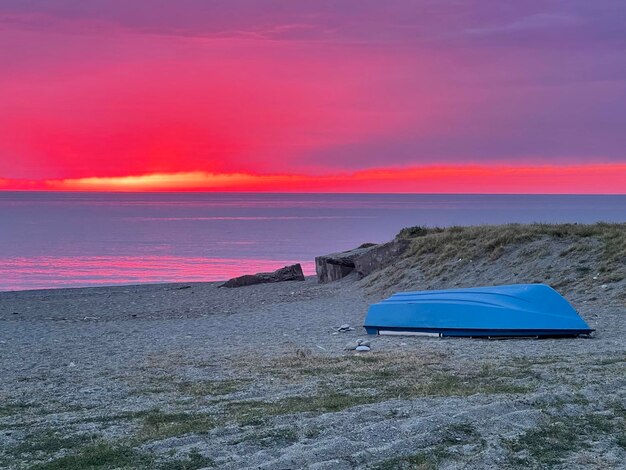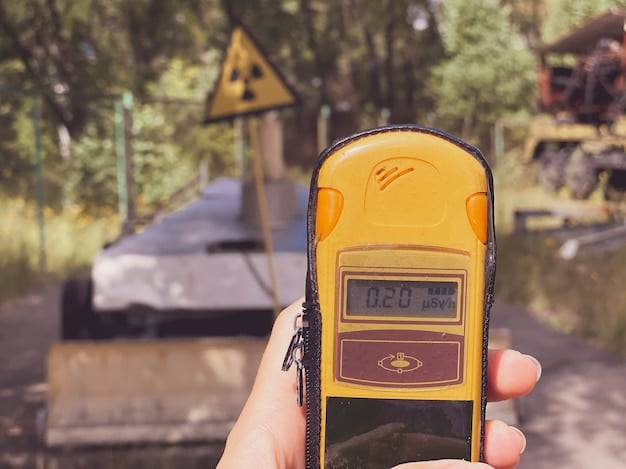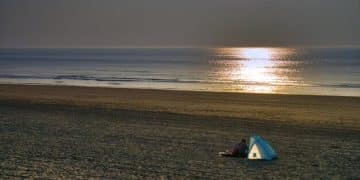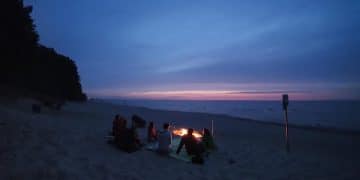Beach Camping: Gear, Tips & Safety – Your Ultimate Guide

Beach camping offers a unique blend of adventure and relaxation, requiring careful planning, the right gear, and a strong focus on safety to ensure a memorable and enjoyable experience.
Dreaming of falling asleep to the sound of waves? Beach camping is an incredible way to connect with nature, but it requires more than just a tent and a sleeping bag. This ultimate guide provides essential gear checklists, vital safety tips, and expert advice to help you plan the perfect beach camping trip.
Choosing the Perfect Beach Camping Location
The allure of beach camping starts with finding the ideal spot. Not all beaches are created equal, and regulations vary widely. Careful research is key to ensuring both enjoyment and compliance with local laws.
Consider factors like permitted camping areas, accessibility, and proximity to amenities like restrooms and water sources. Also, check for any required permits or fees before setting out.
Researching Beach Regulations
Before packing your bags, delve into the specific rules of your chosen beach. Many coastal areas have designated camping zones with limitations on campfires, noise levels, and length of stay.
- Check the official website of the park or recreation area.
- Contact the local ranger station for up-to-date information.
- Read reviews and forums from other campers for firsthand insights.
Considering Beach Accessibility
Think about how you’ll reach your campsite. Some beaches are easily accessible by car, while others require a hike or boat trip. Factor in the distance and terrain when planning your gear list.

Once you’ve considered location, access, and rules, you should be well positioned to reserve your spot and move on to planning the gear that you need.
Essential Beach Camping Gear Checklist
Packing the right gear can make or break your beach camping experience. Beyond the basics, consider items specifically designed for the unique challenges of a sandy environment.
Prioritize lightweight, durable equipment and don’t forget essentials like sunscreen, insect repellent, and a first-aid kit.
Shelter and Sleeping
Your tent is your primary defense against the elements. Choose a tent with good ventilation, sturdy construction, and a rainfly for unexpected showers. A comfortable sleeping bag and pad are also crucial for a good night’s rest.
- A tent designed for beach camping, with extra sand pegs
- A sleeping bag appropriate for the expected nighttime temperatures
- A comfortable sleeping pad or air mattress
Cooking and Food Storage
Plan your meals in advance and pack accordingly. A portable stove, cooking utensils, and food storage containers are essential. Consider using a cooler to keep perishable items fresh.
Lighting and Navigation
Beach camping means limited light once the sun sets. You will want to bring lanterns, flashlights and headlamps with extra batteries.
With the right equipment packed, you’ll be well prepared to enjoy your beach camping trip.
Prioritizing Safety During Beach Camping
While beach camping can be incredibly rewarding, it’s essential to prioritize safety. Awareness of potential hazards and proactive planning can help prevent accidents and ensure a safe trip.
Stay informed about weather conditions, be mindful of wildlife, and take precautions against sun exposure and dehydration.
Weather Awareness
Coastal weather can be unpredictable. Check the forecast before you go and be prepared for sudden changes in temperature, wind, and precipitation.
If severe weather is predicted, consider postponing your trip or seeking shelter in a more protected location.

Wildlife Encounters
Beaches are home to a variety of wildlife, from seabirds to crustaceans. Avoid feeding animals and store food properly to prevent attracting unwanted visitors.
Ocean Safety
If you plan to swim, be aware of currents, tides, and potential hazards like jellyfish. Always swim with a buddy and heed any warnings from lifeguards.
Water safety is vital when camping somewhere near the ocean: be prepared, bring a buddy, and always exercise caution when in the water.
Beach Camping Etiquette and Environmental Responsibility
Respecting the environment and fellow campers is crucial for preserving the beauty of our beaches. Practice Leave No Trace principles and be mindful of your impact on the ecosystem.
Pack out all trash, minimize campfire impact, and avoid disturbing wildlife. Be considerate of noise levels, especially during nighttime hours.
Leave No Trace Principles
The Leave No Trace Center for Outdoor Ethics promotes seven principles for minimizing your environmental impact while camping:
- Plan ahead and prepare.
- Travel and camp on durable surfaces.
- Dispose of waste properly.
- Leave what you find.
- Minimize campfire impacts.
- Respect wildlife.
- Be considerate of other visitors.
Campfire Safety
Campfires can be a cozy addition to beach camping, but they also pose a fire risk. Check local regulations regarding campfires and follow these guidelines:
- Build fires in designated fire pits or rings.
- Keep fires small and contained.
- Never leave a fire unattended.
- Completely extinguish fires before leaving your campsite.
Responsible Waste Disposal
Proper waste disposal is essential for preventing pollution and protecting wildlife. Pack out all trash, including food scraps and wrappers. Use designated recycling bins when available.
With a commitment to these values, we can each do our part to ensure that beaches remain an area everyone can love going camping for years to come.
Making the Most of Your Beach Camping Experience
Beyond the essentials, small touches can elevate your beach camping trip. Consider activities like stargazing, beachcombing, and watersports. Plan to relax and recharge in the serene coastal environment.
Bringing these elements to your camping trip will elevate your experience, providing an unforgettable getaway!
Stargazing on the Beach
Beaches offer exceptional stargazing opportunities with minimal light pollution. Bring a telescope or binoculars and enjoy the celestial display.
Beachcombing Adventures
Explore the shoreline for seashells, driftwood, and other treasures. Beachcombing can be a relaxing and rewarding activity for all ages.
Beachcombing allows you to immerse yourself in nature and possibly find something that catches your eye, so be sure to make time for this activity!
Dealing with Common Beach Camping Challenges
Even with careful planning, beach camping can present unique challenges. Be prepared to deal with sand, insects, and changing tides.
Addressing these challenges proactively can help you stay comfortable and enjoy your trip to the fullest.
Managing Sand and Insects
Sand is an inevitable part of beach camping. Invest in sand mats, brushes, and zippered bags to keep sand out of your tent and belongings. Insect repellent can help ward off mosquitoes, sand fleas, and other pests.
Sand and insects are commonplace on the beach, so being prepared is something that is vital! By bringing insect repellant and taking measures to avoid sand, these nuisances can be avoided.
| Key Element | Brief Description |
|---|---|
| 📍 Location Research | Check regulations & accessibility. |
| 🎒 Gear Checklist | Tent, sleeping bag, cooking utensils. |
| ☀️ Safety First | Weather awareness, wildlife safety, water safety. |
| 🌿 Eco-Responsibility | Leave No Trace, Responsible Campfire. |
FAQ
▼
The best time for beach camping is during the shoulder seasons—spring and fall. The weather is generally milder, the crowds are smaller, and the risk of extreme heat or cold is reduced. Summer can be pleasant, but often more crowded and humid.
▼
Essential items include a sturdy tent with sand pegs, a sleeping bag suitable for the expected temperatures, a portable cooking stove, plenty of water, sunscreen, insect repellent, a first-aid kit, and a trash bag for waste disposal.
▼
To protect yourself from insects, use insect repellent containing DEET or picaridin. Wear long sleeves and pants during dawn and dusk when insects are most active. Consider using a mosquito net over your sleeping area for added protection.
▼
If you encounter wildlife, maintain a safe distance and avoid feeding the animals. Store food in sealed containers or hang it from a tree to prevent attracting unwanted visitors. Never approach or harass wildlife, as this can be dangerous.
▼
Minimize your environmental impact by practicing Leave No Trace principles. Pack out all trash, use biodegradable soap, avoid disturbing vegetation, and respect wildlife. Use established trails and campsites to minimize erosion.
Conclusion
By planning ahead, packing the right gear, prioritizing safety, and respecting the environment, you can enjoy a truly memorable and fulfilling beach camping experience. So pack your bags, grab your sunscreen, and get ready to soak up the sun and sounds of the ocean!





